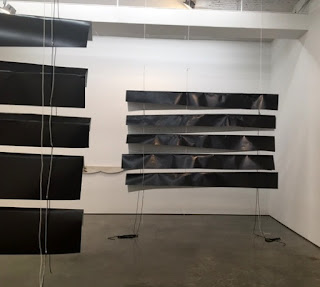 |
| The Diagonal of May 25, 1963 by Flavin |
 |
| Nora Schultz's Venetian Blinds |
Our recent Chelsea exploration also yielded some works that left me scratching my head. I definitely didn't get Nora Schultz's oversized Venetian blinds at an exhibit entitled "See sun and think shadow" at the Gladstone Gallery. Having taken contemporary art classes for years, Wendi was able to go into a riff about the artist's possible intentions. Perhaps it was a comment on how sculptural forms have evolved since the classical tradition. Maybe it was a gender piece -- the blinds are a household item and the string and yarn that make up the pulls are associated with sewing. The gallery's description only said that the blinds "while functional, negate their purpose without a light source to block." Time to move on.
I sort of liked Bas Jan Ader's installations at Metro Pictures. The artist's personal story, which includes a father who was executed while in the German resistance, imbues his work with a sense of loss. (Click here to read more about Ader's work and background.) One of the practical questions I had is how the installations are done since it's unlikely the artist was onsite to supervise. The gallery's gatekeeper explained that works like this come with detailed directions from the artist. In addition to instructions about height and spacing of the verbiage and distance of the light from the wall, the flowers are intended to bloom, die and be replaced at the end of each week. (This time frame corresponds with the duration of the original showing of the work.) We also learned that Ader died mysteriously at sea in 1975 on a voyage that was part of a trilogy he was in the process of creating. There have apparently been rumors that the disappearance was a stunt; if so, it was a very successful one.
 |
| Thoughts unsaid then forgotten by Bas Jan Ader |
 |
| Recreation of Gordon Parks' American Gothic |
Other than the Serra installations, my favorite exhibit by far was at the Yancy Richardson Gallery. When we entered the gallery, I looked around with a bit of confusion. John Malkovich seemed to have morphed into every photograph in the exhibit. What was going on????
Malkovich, of course, is known for being quirky. So I can imagine he was easily persuaded to sign on for friend Sandro Miller's recreation of iconic photographs by the likes of Richard Avedon, Diane Arbus, Irving Penn and Dorothea Lang. Malkovich reportedly said, "I had always heard the camera doesn't lie. I looked at this as a chance to explore that."
Malkovich, of course, is known for being quirky. So I can imagine he was easily persuaded to sign on for friend Sandro Miller's recreation of iconic photographs by the likes of Richard Avedon, Diane Arbus, Irving Penn and Dorothea Lang. Malkovich reportedly said, "I had always heard the camera doesn't lie. I looked at this as a chance to explore that."
While one might initially think of Sandro Miller's "Homage: Malkovich and the Masters" as a joke of sorts, Miller truly does intend it as an homage to fellow photographers. He conducted extensive research into the way each photograph was originally produced. To the extent possible, Miller recreated both the style of the picture and the printing method used. He even interviewed the original photographers who are still living. (I would have loved to have heard their reactions to the project.) To my untrained eye, he did a terrific job of capturing everything from the whimsy of Herb Ritts' pictures of Jack Nicholson as the Joker to the gravity of Edward Curtis' "Three Horses, 1905."
To view more of the exhibit alongside the original photographs, click here. And go here for a great article by Christopher Borelli in the Chicago Tribune that includes commentary from both Miller and Malkovich.
If there's one thing I can say with certainty, it's that I never know what to expect when gallery hopping in Chelsea. I'm already looking forward to my next visit.




No comments:
Post a Comment